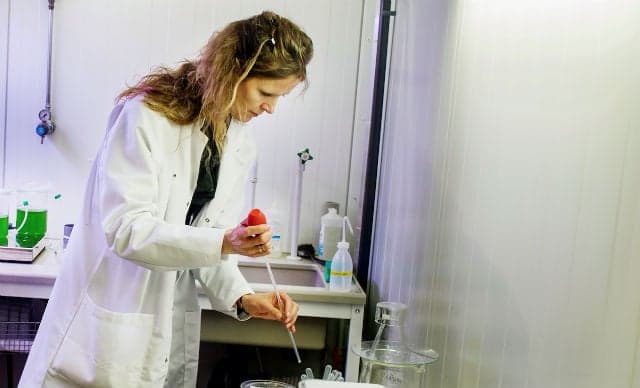Worried about the environment? This Danish uni can make you part of the solution
Are you passionate about environmental issues and want to pursue a career with purpose? The environmental field is competitive, but a master’s degree in Environmental Risk could be your golden ticket.

34-year-old Talhiya Ali dreamed of becoming a lecturer in environmental science. The Tanzanian already held a bachelor’s degree specialising in teaching chemistry and biology but wanted to deepen her knowledge of environmental risk and its assessment.
“I was recommended the Environmental Risk programme at Roskilde University by my bachelor lecturer and project supervisor,” she told The Local.
 Photo: Talhiya Ali
Photo: Talhiya Ali
Roskilde University is a research-driven university in Denmark, a country well-regarded for its environmental policies and commitment to sustainability. The university is just half an hour away from Copenhagen, Denmark’s trendy capital city where the UN City complex is located, and the international Environmental Risk master’s programme is solidly connected to the UN’s sustainability goals. The University has a teaching philosophy based on problem-oriented project learning and employ interdisciplinary approaches to solve real-life challenges.
Find out more about the international master’s in Environmental Risk at Roskilde University
The programme’s interdisciplinary curriculum focuses on imparting the skills students need to understand and assess pressing environmental issues. Covering topics such as the evaluation of technologies and chemicals that can damage ecosystems, implementation of environmental legislation and the key disciplines of environmental risk, students use natural and societal scientific methods to assess and manage environmental risks.
 Zanzibar. Photo: Roskilde University
Zanzibar. Photo: Roskilde University
“The courses cover different disciplines in the mandatory part and the second semester courses can cover, for example, analytical chemistry, physics and environmental planning and management, which will provide a multidisciplinary approach to environmental risk,” explains Henriette Selck, head of studies for the Environmental Risk master’s programme.
Henriette adds that this is a great advantage for graduates when they apply for jobs as most solutions to environmental issues require a multidisciplinary approach. Only a few students are equipped to tackle problems in this way as the majority of environmental programmes cover either natural or social sciences - but not usually both.
It’s an aspect of the two-year programme that Talhiya found particularly valuable. She appreciated the problem-solving approach and learning to assess environmental issues using tools and techniques from several scientific disciplines.
She explained how this interdisciplinarity worked in practice: “I studied ecotoxicology which is biological but first I learned the overview of environmental components, like what is within the earth, which is a geographical area. I also learned how pollutants introduced into our environment are transferred from generation to generation through feeding level or another physical transport phenomenon which employs biology, chemistry and physics.”
 Garbage/plastic pollution from the sea. Photo: Shutterstock
Garbage/plastic pollution from the sea. Photo: Shutterstock
Apply for the Environmental Risk master’s degree scholarship
The programme is taught in English and the cohort is international so Talhiya was able to brush up on her language skills while she studied. Her fellow students hailed from all over the world, their different perspectives enhancing topical discussions around issues such as natural and anthropogenic hazards. Moreover, the university’s open-door policy means there’s always a scientist on-hand to offer their expertise.
Talhiya realised her dream and is now working as an assistant lecturer at The State University of Zanzibar. She frequently consults on student projects, supporting students who are doing their research in the aquatic environment, the topic she specialised in and in which the Environmental Risk master’s programme is particularly strong.
Education is one option for graduates but the career opportunities within the environmental field are endless, says Henriette.
“Jobs could be within academia, environmental protection agencies, the environmental section of industries or NGOs. Our graduates are working within all of these.”
There is one scholarship available for the Environmental Risk master’s programme, starting September 2019. Click here to find out more about fees and how to apply for the scholarship.
This article was produced by The Local Creative Studio and sponsored by Roskilde University.
This content was paid for by an advertiser and produced by The Local's Creative Studio.

Join the conversation in our comments section below. Share your own views and experience and if you have a question or suggestion for our journalists then email us at [email protected].
Please keep comments civil, constructive and on topic – and make sure to read our terms of use before getting involved.
Please log in here to leave a comment.